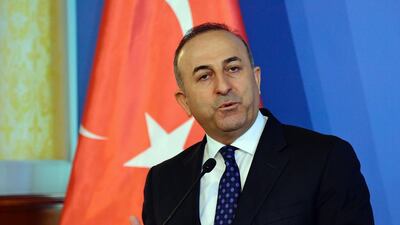Turkey and Saudi Arabia could launch a ground operation against ISIL extremists in Syria as part of a coordinated strategy with the US-led coalition, the Turkish foreign minister said on Saturday.
Mevlut Cavusoglu said Riyadh had already sent fighter jets to Turkey’s Incirlik airbase.
“Some say ‘Turkey is reluctant to take part in the fight against Daesh,’” Mr Cavusoglu was quoted by Turkish media as saying at the Munich Security Conference. “But it is Turkey that is making the most concrete proposals.”
He clarified that “there is no plan” yet for Saudi ground forces to deploy to Turkey’s border with Syria. But he said his Saudi counterpart had told him that “if the necessary time comes for a ground operation then we could send soldiers”.
Saudi foreign minister Adel Al Jubeir said on Saturday that “if the coalition should decide to deploy special forces in the fight against IS in Syria, Saudi Arabia will be ready to participate”.
While both Turkey and Saudi Arabia are the main regional backers of Syrian rebels, along with Qatar, they have had tense relations since 2011 and have supported different rebel groups in Syria.
But Ankara and Riyadh now appear to be coordinating much more closely in the face of major advances by regime and militia forces, led by Iran and backed by a crushing Russian air campaign. These advances have allowed regime forces to nearly encircle the key northern city of Aleppo, half of which is held by rebels.
In recent days the conflict in Syria has grown even more volatile as the various local, regional and international players react to the Russian-backed offensive that has tipped the balance of power on the ground towards the Syrian regime, and as regime forces intensify their military efforts to take Aleppo completely ahead of a potential pause in fighting.
Further complicating the dynamics, Kurdish forces in northern Syria who had been coordinating closely with the US against ISIL now appear to also be coordinating with the Russian air force. Earlier this week these forces – supported by Russian air strikes – captured the Menagh airbase from Turkish-backed Syrian rebels.
On Saturday Turkish artillery began bombarding areas of Aleppo province controlled by Kurdish YPG forces, according to the Syrian Observatory for Human Rights, a Britain-based monitoring group.
“Turkey (Nato member) is bombing YPG (backed by US, Russia) & SDF (backed by US), for attacking FSA (backed by US, Turkey & Saudi),” tweeted Charles Lister, an expert on the conflict and fellow at the Middle East Institute, underlining the growing confusion.
Meanwhile, about 20 Russian warplanes were spotted over northern Aleppo province on Saturday as regime forces pressed their offensive to encircle the city, according to Mr Lister.
Supporters of rebel forces have also increased delivery of anti-tank missiles and grad rockets in the same region to counter the regime’s advances, he said, citing sources in the FSA. This comes after the United States enforced a slowdown of arms deliveries to the rebels ahead of now-suspended peace talks in Geneva earlier this month.
Syrian and Iranian-led forces also pushed into ISIL-dominated Raqqa province on Saturday for the first time since 2014.
The move is potentially an attempt to pre-empt plans by the US-led coalition against ISIL to send in special forces there to back rebels in the fight against the extremist group.
Saudi and UAE officials have said they would send in special forces to help rebels free territory from the extremist group, and the Syrian regime and its backers may fear that this could free up rebel manpower and resources to turn against the regime.
On Friday US defence secretary Ash Carter said Saudi Arabia had also agreed to restart air strikes against ISIL in Syria. Gulf countries suspended air operations as part of the US-led coalition last summer to focus on the war against Houthi rebels in Yemen. The Saudi F-15 jets that arrived at the Turkish airbase on Saturday are a sign that they could restart their involvement in Syria imminently.
Saudi Arabia’s indication that it is willing to send ground forces to Syria is likely a move to both address criticism by the US and others that they are not doing enough to fight ISIL directly, and to pressure Washington to do more in Syria against both the extremists and the regime.
“It is also important to note that the US has given little indication that it is ready to lead any sort of ground operation inside Syria,” said Fahad Nazer, said Fahad Nazer, a Saudi Arabia analyst at the intelligence consultancy JTG, Inc. “The Saudi offer [to send in ground troops], along with the massive Northern Thunder military exercises which it is conducting alongside 21 other nations from the wider Middle East region, may be intended to spur the US to expand its military engagement in Syria.”
Mr Al Assad, meanwhile, on Friday responded to the increasing talk of Gulf and Turkish forces operating in Syria by saying his troops “will certainly confront it”.
In Munich on Friday, US, European and Arab supporters of Syrian rebels agreed with Damascus’s Iranian and Russian allies to work out the terms of a temporary “cessation of hostilities” that would come into effect within one week so that humanitarian aid could be delivered to besieged Syrian civilians.
But on Saturday Russian foreign minister Sergei Lavrov played down hopes for the agreement, saying he put its chances of succeeding at “49 per cent”.
Neither Mr Al Assad nor the Syrian opposition have agreed to the plan, and rebels and western diplomats have said it will not work unless Russia stops bombing rebel-held civilian areas. Moscow maintains that it is only striking ISIL or Al Qaeda affiliate Jabhat Al Nusra.
tkhan@thenational.ae
* With additional reporting by AFP

